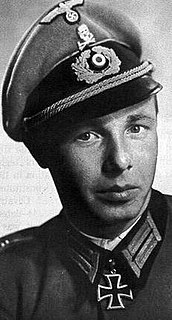
Operation Barbarossa was the code name for the Axis invasion of the Soviet Union, which started on Sunday, 22 June 1941, during World War II. The operation put into action Nazi Germany's ideological goal of conquering the western Soviet Union so as to repopulate it with Germans. The German Generalplan Ost aimed to use some of the conquered as slave labour for the Axis war effort, to acquire the oil reserves of the Caucasus and the agricultural resources of Soviet territories, and eventually through extermination, enslavement, Germanization and mass deportation to Siberia, remove the Slavic peoples and create Lebensraum for Germany.

Fritz Erich Georg Eduard von Manstein was a German commander of the Wehrmacht, Nazi Germany's armed forces during the Second World War. He attained the rank of field marshal.

Heinz Wilhelm Guderian was a German general during World War II who, after the war, became a successful memoirist. An early pioneer and advocate of the "blitzkrieg" approach, he played a central role in the development of the panzer division concept. In 1936, he became the Inspector of Motorized Troops.

The Battle of Berlin, designated the Berlin Strategic Offensive Operation by the Soviet Union, and also known as the Fall of Berlin, was one of the last major offensives of the European theatre of World War II.

Friedrich Wilhelm Ernst Paulus was a German field marshal during World War II who commanded the 6th Army during the Battle of Stalingrad. The battle ended in disaster for the Wehrmacht when Soviet forces encircled the Germans within the city, leading to the ultimate defeat and capture of about 265,000 German personnel, their Axis allies and collaborators.

The European theatre of World War II was an area of heavy fighting across Europe, starting with Germany's invasion of Poland on 1 September 1939 and ending with the United States, the United Kingdom and France conquering most of Western Europe, the Soviet Union conquering most of Eastern Europe and Germany's unconditional surrender on 8 May 1945. The Allied powers fought the Axis powers on two major fronts as well as in a strategic bombing offensive and in the adjoining Mediterranean and Middle East theatre.

Vladimir Bogdanovich Rezun, known by his pseudonym of Viktor Suvorov, became known as a Russian writer on Soviet military history after he defected to the United Kingdom in 1978. Of Russian-Ukrainian ancestry, Suvorov attended Russian military schools, was a veteran of the armed forces, and had worked as a Soviet military intelligence officer in the Soviet Union.
Icebreaker: Who Started the Second World War? is a military history book by Viktor Suvorov, first published in Russian in 1987. Suvorov argued that Stalin planned a conquest of Europe for many years and was preparing to launch a surprise attack of Nazi Germany at the end of summer of 1941 to begin that plan. He says that Operation Barbarossa was a pre-emptive strike by Hitler, which the Nazi leader had argued. Since the 1990s and the dissolution of the Soviet Union, this theory has received some support among historians in some post-Soviet and Central European states, but Western scholars have criticized his conclusions for lack of evidence and documentation.

Adolf Hitler was an Austrian-German politician who was the leader of the Nazi Party, Chancellor of Germany from 1933 to 1945, and Führer ('Leader') of Nazi Germany from 1934 to 1945. He killed himself by gunshot on 30 April 1945 in his Führerbunker in Berlin. Eva Braun, his wife of one day, committed suicide with Hitler by taking cyanide. In accordance with his prior written and verbal instructions, that afternoon their remains were carried up the stairs through the bunker's emergency exit, doused in petrol, and set alight in the Reich Chancellery garden outside the bunker. Records in the Soviet archives show that their burned remains were recovered and interred in successive locations until 1946. They were exhumed again and cremated in 1970, and the ashes were scattered.

Helmuth Otto Ludwig Weidling was a German general during World War II. He was the last commander of the Berlin Defence Area during the Battle of Berlin, and led the defence of the city against Soviet forces, finally surrendering just before the end of World War II in Europe.
Joachim Hoffmann was a German historian and scientific director of the German Armed Forces Military History Research Office.

Erich Hoepner was a German general during World War II. An early proponent of mechanisation and armoured warfare, he was a Wehrmacht army corps commander at the beginning of the war, leading his troops during the invasion of Poland and the Battle of France.
The Case of the Trotskyist Anti-Soviet Military Organization, also known as the "Military Case" or the "Tukhachevsky Case", was a 1937 secret trial of the high command of the Red Army, a part of the Great Purge.
M-Day is a book by Viktor Suvorov about Soviet Army preparations for the invasion of Germany. The author argues that the Soviet Army was preparing to attack the Germans when Adolf Hitler forestalled Joseph Stalin on 22 June 1941.

The Bunker, also published as The Berlin Bunker, is a 1975 account, written by American journalist James P. O'Donnell and German journalist Uwe Bahnsen, of the history of the Führerbunker in early 1945, as well as the last days of German dictator Adolf Hitler. The English edition was first published in 1978. Unlike other accounts O'Donnell focused considerable time on other, less-famous, residents of the bunker complex. Additionally, unlike the more academic works by historians, the book takes a journalistic approach. The book was later used as the basis for a 1981 CBS television film with the same name.
Stalin's Missed Chance is a study by Russian military historian Mikhail Ivanovich Meltyukhov, author of several books and articles on Soviet military history.

Gerhard Boldt was an officer in the German Army (Heer) who wrote about his experiences during World War II.

The Soviet Union signed a non-aggression pact with Nazi Germany on 23 August 1939. In addition to stipulations of non-aggression, the treaty included a secret protocol that divided territories of Romania, Poland, Lithuania, Latvia, Estonia, and Finland into German and Soviet Union "spheres of influence", anticipating potential "territorial and political rearrangements" of these countries. In October and November 1940, German-Soviet talks about the potential of joining the Axis took place in Berlin, nothing came from the talks since Hitler's Ideological goal was Lebensraum in the East.

The Soviet offensive plans controversy is a debate among historians whether Soviet leader Joseph Stalin planned to attack Axis forces in Eastern Europe prior to Operation Barbarossa. Most historians agree that the geopolitical differences between the Soviet Union and the Axis made war inevitable, and that Stalin had made extensive preparations for war and exploited the military conflict in Europe to his advantage. Viktor Suvorov has argued that Stalin planned to attack Hitler from behind while Germany fought the Allies, and Barbarossa was a preemptive strike by Hitler. Many historians have written in response to Suvorov's views. Gabriel Gorodetsky and David Glantz authored books debunking his claims. Suvorov received some support from Valeri Danilov, Joachim Hoffmann, Mikhail Meltyukhov, and Vladimir Nevezhin

Verlorene Siege is the personal narrative of Erich von Manstein, a German field marshal during World War II. The book was first published in West Germany in 1955, then in Spain in 1956. Its English translation was published in 1958 for distribution in the UK and the US.















